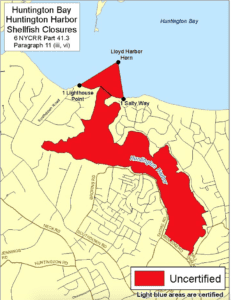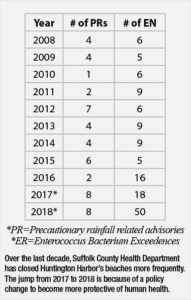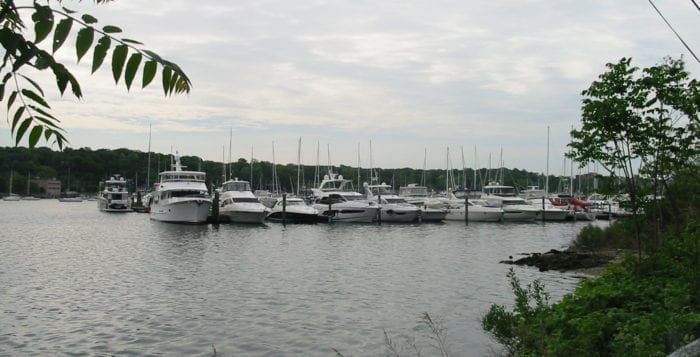Baymen vs. baymen: Shellfish dredging stirs controversy in Huntington
It was baymen versus baymen at the podium during Huntington’s town meeting last month, with two sides arguing whether or not the shellfish harvesting technique known as sail dredging should be banned.

Charles Murphy, the president of the North Shore Baymen’s Association, said that the practice of raking with mechanical means through the bay floor is barbaric, destroys underwater lands and results in overharvesting. He recommends only hand-harvesting shellfish.
“Over the last six years, the operators of four diesel powered boats have stolen millions of dollars’ worth of clams and oysters from the Town of Huntington’s waters,” Murphy said in a letter circulated in the community. “These diesel boats, as well as some of the smaller boats, have put a big time hurting on the bay.”
Other baymen said a ban or regulation over the practice of sail dredging, which differs from mechanical dredging, is unwanted and likely even unnecessary, pointing out that the last 10 years’ oyster harvests have been particularly good.
“We’re getting squeezed,” Bob Cannon, a fisherman who spoke at the meeting, said to the town council. “I prefer if you don’t make our lives any more difficult.”
George Doll has been a Northport fisherman since 1958 and formerly served as Northport’s mayor for the last 12 years. Sail dredging, he explained in an interview, is mainly used during the winter months when fishermen struggle to make ends meet. It relies on wind in a sail to drive a rake through the bay floor to harvest shellfish.
Dom Spada, the deputy mayor and police commissioner of the Village of Huntington Bay, said in a phone interview that mechanical dredging, using motorized engines to harvest shellfish, has always been prohibited.
The town, he said, has issued in recent years summons to people harvesting shellfish using mechanical equipment. He was unable to provide statistics on the problem.
As for sail dredging, he said it’s status quo. The seasonal and locational restrictions that apply for hand-harvesting also apply to sail dredging.
The board has 90 days from May 29 to vote on the issue. However, the topic is currently not on the next town meeting agenda.
Core issue: Water quality
The dredging debate is surfacing just as New York State Gov. Andrew Cuomo (D) is advancing a major $10.4 million Long Island Shellfish Restoration Project. Huntington Harbor was selected as one of five bodies of water where hundreds of millions of clams and oysters are being sowed to improve water quality.
 Christopher Gobler, the chair of Coastal Ecology and Conservation at Stony Brook University’s School of Marine and Atmospheric Sciences, is a co-chair for the project. He said he knows of no good information about the shellfish population trends for Huntington Harbor over time that might indicate whether or not shellfish are overharvested. One trend is clear: Huntington Harbor’s water quality needs improving. Gobler said his team identified five ecosystems that would most benefit from additional filtration, and Huntington ranks among the chosen few.
Christopher Gobler, the chair of Coastal Ecology and Conservation at Stony Brook University’s School of Marine and Atmospheric Sciences, is a co-chair for the project. He said he knows of no good information about the shellfish population trends for Huntington Harbor over time that might indicate whether or not shellfish are overharvested. One trend is clear: Huntington Harbor’s water quality needs improving. Gobler said his team identified five ecosystems that would most benefit from additional filtration, and Huntington ranks among the chosen few.
Suffolk County Health Department has documented 139 beach closures over the last decade in Huntington Harbor caused by high levels of Enterococcus bacteria, a fecal bacterium.
The New York State Department of Environmental Conservation, together with the Town of Huntington, Stony Brook University and the Cornell Cooperative Extension of Suffolk County, will plant up to 650,000 adult clams, 5.1 million seed clams and 1 million oysters spat-on-shells this summer and fall, based on availability.
The project hopes to improve water quality, mitigate harmful algal blooms, restore shellfish populations and increase biodiversity in coastal waters.
“Let’s hope the dredge boats don’t steal these clams,” Murphy stated in the document that he circulated in the community.







